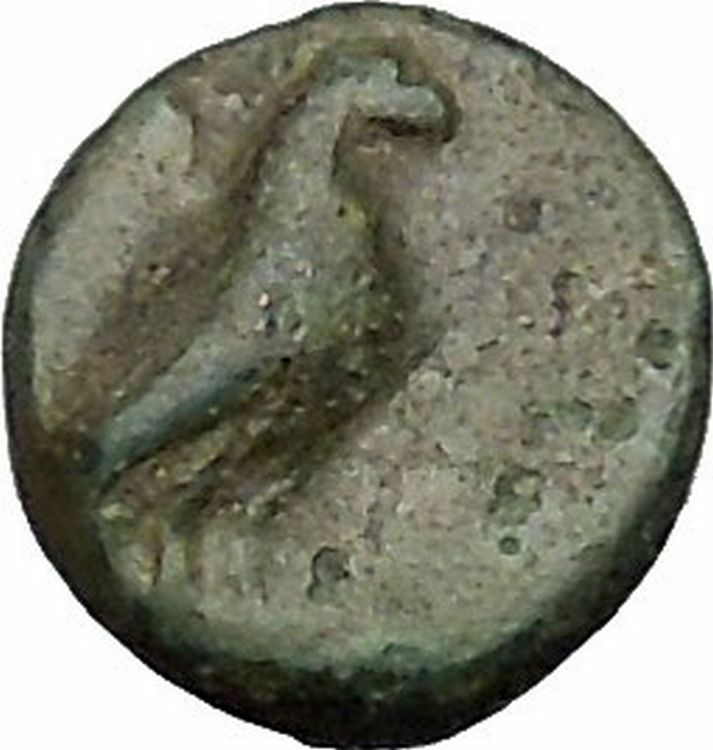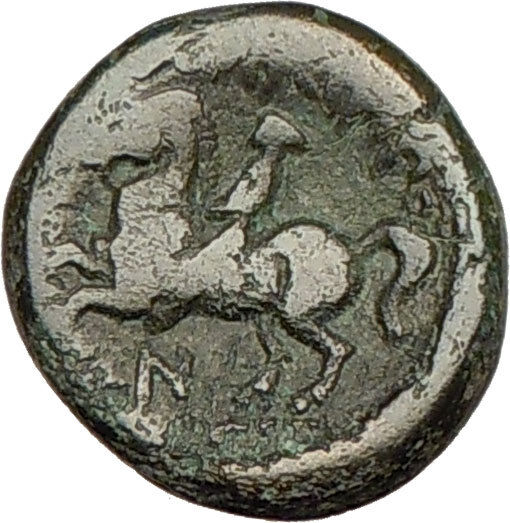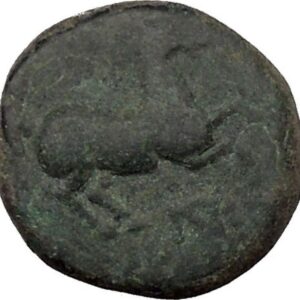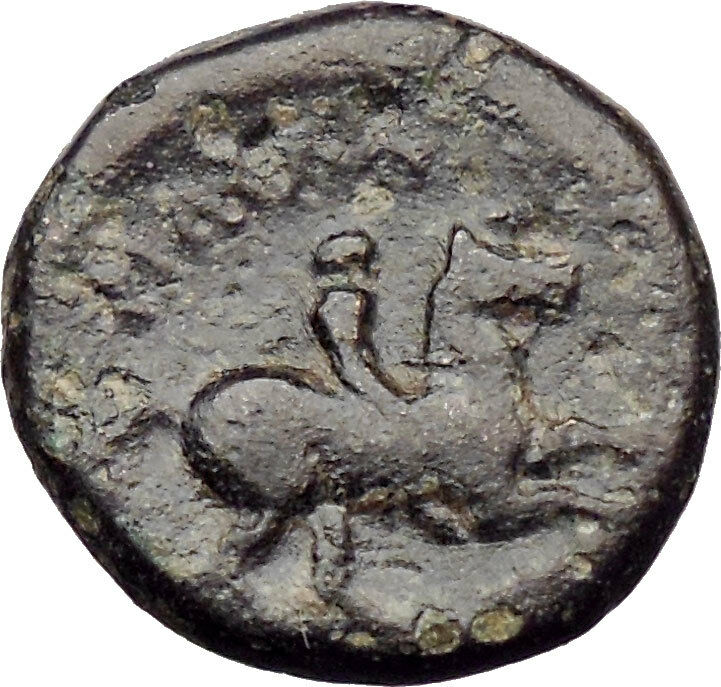|
Greek Coin of Seleukid Kingdom
Alexander II Zabinas – Reigned: 128-123 B.C.
Bronze 21mm (7.76 grams) Antioch on the Orontes mint
Reference: HGC 9, 1163; SC 2233
Radiate and diademed head of Alexander II right.
ΒΑΣΙΛΕΩΣ / ΑΛΕΞΑΝΔΡΟΥ, Athena standing left, holding Nike and spear, shield propped below; symbols and monograms to left.
Claiming to be an adopted son of Alexander Balas, Zebina rebelled against Demetrios II with the backing of Ptolemy VII of Egypt. Five years later he was defeated by the forces of Cleopatra and her son Antiochos VIII.
You are bidding on the exact item pictured, provided with a Certificate of Authenticity and Lifetime Guarantee of Authenticity.
 Athena or Athene (Latin: Minerva), also referred to as Pallas Athena, is the goddess of war, civilization, wisdom, strength, strategy, crafts, justice and skill in Greek mythology. Minerva, Athena’s Roman incarnation, embodies similar attributes. Athena is also a shrewd companion of heroes and the goddess of heroic endeavour. She is the virgin patron of Athens. The Athenians built the Parthenon on the Acropolis of her namesake city, Athens, in her honour (Athena Parthenos). Athena’s cult as the patron of Athens seems to have existed from the earliest times and was so persistent that archaic myths about her were recast to adapt to cultural changes. In her role as a protector of the city (polis), many people throughout the Greek world worshiped Athena as Athena Polias (“Athena of the city”). Athens and Athena bear etymologically connected names. Athena or Athene (Latin: Minerva), also referred to as Pallas Athena, is the goddess of war, civilization, wisdom, strength, strategy, crafts, justice and skill in Greek mythology. Minerva, Athena’s Roman incarnation, embodies similar attributes. Athena is also a shrewd companion of heroes and the goddess of heroic endeavour. She is the virgin patron of Athens. The Athenians built the Parthenon on the Acropolis of her namesake city, Athens, in her honour (Athena Parthenos). Athena’s cult as the patron of Athens seems to have existed from the earliest times and was so persistent that archaic myths about her were recast to adapt to cultural changes. In her role as a protector of the city (polis), many people throughout the Greek world worshiped Athena as Athena Polias (“Athena of the city”). Athens and Athena bear etymologically connected names.
Alexander II Zabinas, ruler of the Greek Seleucid kingdom, was a counter-king who emerged in the chaos following the Seleucidian loss of Mesopotamia to the Parthians. Zabinas was a false Seleucid who claimed to be an adoptive son of Antiochus VII Sidetes, but in fact seems to have been the son of an Egyptian merchant named Protarchus. Antioch, Apamea, and several other cities, disgusted with the tyranny of Demetrius, acknowledged the authority of Alexander. He was used as a pawn by the Egyptian king Ptolemy VIII Tryphon, who introduced Zabinas as a means of getting to the legitimate Seleucid king Demetrius II, who supported his sister Cleopatra II against him in the complicated dynastic feuds of the latter Hellenistic dynasties.
Zabinas managed to defeat Demetrius II, who fled to Tyre and was killed there, and thereafter ruled parts of Syria (128 BC-123 BC), but soon ran out of Egyptian support and was in his turn was defeated by Demetrius’ son Antiochus VIII Grypus.
Zabinas fled to the Seleucid capital Antiochia, where he plundered several temples. He is said to have joked about melting down a statuette of the goddess of victory Nike which was held in the hand of a Zeus statue, saying “Zeus has given me Victory”. Enraged by his impiety the Antiochenes cast Zabinas out of the city. He soon fell into the hands of robbers, who delivered him up to Antiochus, by whom he was put to death, in 122 BC.
The name “Zabinas” means “the purchased slave”, and was applied to him, deprecatingly, in response to a report that he had been bought by Ptolemy as a slave. For reasons unknown, Alexander II was the only late Seleucid not to use epithets on his coins. Several of his coins are extant.
Preceded byy
Antiochus VII Sidetes |
Seleucid King
128–123 BC |
Succeeded by
Antiochus VIII Grypus
and
|
Seleucid Empire
Σελεύκεια
Seleúkeia |

|
312 BC–63 BC |
↓ |
|
|
The Seleucid Empire in 301 BC.
|
The Seleucid Empire was a Hellenistic state ruled by the Seleucid dynasty founded by Seleucus I Nicator following the division of the empire created by Alexander the Great. Seleucus received Babylonia and, from there, expanded his dominions to include much of Alexander’s near eastern territories. At the height of its power, it included central Anatolia, the Levant, Mesopotamia, Kuwait, Persia, Afghanistan, Turkmenistan, and northwest parts of India.
The Seleucid Empire was a major center of Hellenistic culture that maintained the preeminence of Greek customs where a Greek-Macedonian political elite dominated, mostly in the urban areas. The Greek population of the cities who formed the dominant elite were reinforced by emigration from Greece. Seleucid expansion into Anatolia and Greece was abruptly halted after decisive defeats at the hands of the Roman army. Their attempts to defeat their old enemy Ptolemaic Egypt were frustrated by Roman demands. Much of the eastern part of the empire was conquered by the Parthians under Mithridates I of Parthia in the mid-2nd century BC, yet the Seleucid kings continued to rule a rump state from the Seleukid Kingdom until the invasion by Armenian king Tigranes the Great and their ultimate overthrow by the Roman general Pompey.
|












